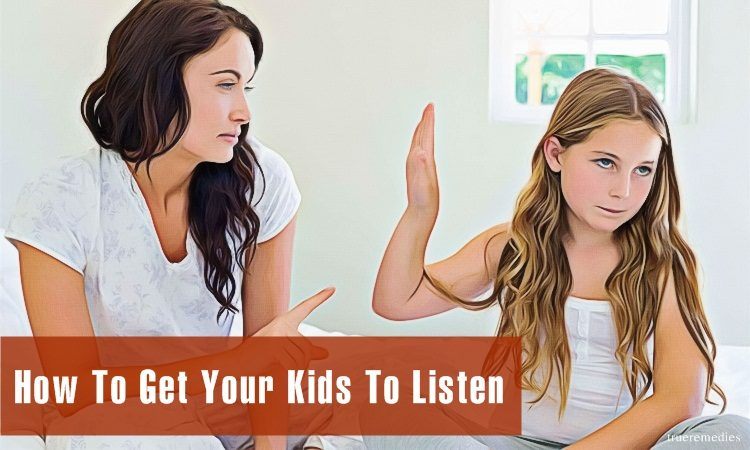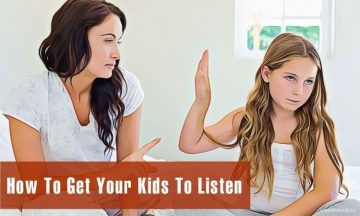Contents
Shouting at or violence into kids to force them to give up bad behavior does not always bring good results as we think. Many of these cases have caused serious psychological effects on kids, causing them to become timid, depressed, or to have a predisposition to violence in the future. Today, Trueremedies will introduce to you a few tips on how to get your kids to listen without yelling to help you make them more obedient easily.
- 8 Useful Tips On How To Help An Angry Child Calm Down
- 13 Warning Signs Of Childhood Depression And Anxiety
Top 15 Easy Tips To Get Your Kids To Listen Without Yelling
I. Why Do Parents Yell?
When we feel angry and overwhelmed, we tend to raise our voices; in other words, we yell at our kids. However, this action rarely solves the problem. Although it may make kids quiet and obedient for a short time, it will not make them correct their attitudes or behavior. In short, it causes them to fear parents rather than to understand the consequences of their actions. Parents influence their children's development[1] [2]. If parents are often anger and show associated aggression such as shouting, their children's behavior will reflect that.
According to parent educator Laura Markham, your most important job as a parent, besides ensuring the safety of your kids, is to control your emotions[3].
II. Harmful Effects Of Yelling
It is the fact that if you are yelled at, you certainly know a loud voice just makes the message unclear. And for your kids, it is the same. Shouting will make them stop listening and it is obvious that discipline will be harder because whenever you raise your voice reduces their receptivity.
According to research, yelling is the reason why kids are more aggressive, both physically and verbally[4]. In general, yelling, no matter what the reason and context, is also a form a person expresses anger. So it makes kids scared and feels insecure. Instead, parents should show calmness, which makes the kids feel loved and accepted although they have just made bad behavior.
If shouting at kids is not good, yelling coming with verbal insults and putdowns can be considered as emotional abuse. It has been proven to cause long-term effects, such as anxiety, increased aggression, and low self-esteem.
TrueRemedies Partner Solutions

Need a Help from the Leading Expert Online, Available 24/7?
They’re all here and ready to answer your questions online or by phone. Keep asking questions until you get the answer you need.
Also, it makes kids more susceptible to bullying because their understanding of self-respect and healthy boundaries are skewed.
III. How To Get Your Kids To Listen Without Yelling
1. Let Your Baby's Inner Feelings Subside
If your child feels uncomfortable and irritated about something and then he cries, don't try to say anything or teach him anything right now because he won't listen to you.
Do not join in and force him to listen to when he is irritated. Try to wait until he stops crying, or the emotions gradually calm down and then try to talk about this topic. Think of this as yourself. Assuming you are experiencing something sad or frustrating; but your parents are completely unconcerned about your emotions and constantly talk harsh and cursing words, it will only make you angrier.
Whether he is a small child or an adult, you should not forget this rule: Speak at the right place and at the right time. When the emotions overflow, the mind will fall asleep. As a parent, you need to think about your child's feelings first.
2. Speak Sweet Words
When your child is fussy, upset, sad, or frustrated about something and refuses to listen, you should not be so yelling or ordering him in front of people.
Say sweet words to him in case he doesn't listen, such as “It is really sad when you let me go home alone?” Children who don't like to be ordered, but in return, they are very soft-hearted. If you gently tell them, they will listen to your words instead of re-telling you. Remember this!
3. Walk Before You Talk
Instead of yelling from room to room and disturbing other rooms or houses (most of us often do this), refrain from waiting for your child to calm down. Then invite him outside and walk with you; talk gently to him about the issues. Remember that you are a great role model for the behavior your child will follow.
If he sees you yelling throughout the day, he will do the same to his children later. Maybe you used to scream or grumble in the past if you feel dissatisfied and frustrated, but from now on, try to restrain yourself. Because you are a parent, you need to be calm enough to listen and help your kids solve their problems.
How can you help someone with a hot head like boiling water and let out harsh words throughout the day? Your kids will be aware that if they share with you, they will only make you angrier or will be scolded for nothing. Later they will shut everything up and this is very dangerous that will lead to cracking in family relationships later.
4. Connect With Your Kids Before Talking
Nothing will change if you turn your back on your child or stay in another closed room to stand the anger. Many parents often do this and think that this is a wise way; at least they do not yell at their kids to make things worse. But in fact, this way does not bring positive results for both. You turn your back on your children, and have a cold war with them, which means you have abandoned them. The kids will feel lonely and think that parents no longer care about themselves.
Make sure you face your child and solve the problem together. Ensure you always look at your child while talking to him. This can be thought of as a television; if not plugged in, there will be no programs to play. And you need to connect with your child. No conversation will take place if the two are silent.
5. Use The Right Words
Absolutely do not use vulgar, difficult-to-hear words to scold children, because they will not only not listen to you but also imitate using those words later. When talking to them, you need to cleverly use some open questions so that they can speak their problems. Listen and find a solution together. For example, if you want your kids to tidy their room before going out with their friends, tell them, “Have you cleaned the room yet?” Or “When you're done tidying up your room, you can hang out with your friends whenever you want.” The art here is that you give them an incentive to do this job, instead of ordering them.”
6. Give Them More Attractive Options
When your child wants something you disagree with, you can offer them another option instead of yelling at and rejecting them. For example: “You can't go to the park today but we can go skating together!” Then you praise what the skating brings; try to describe it appealingly so that it can attract to your child. This is much better and your child will listen better instead of telling them “No!”
7. Try To Keep It Short
You do not need to talk in a long-winded way when you want to teach or yell at your child for something. Try to keep it simple, short and focal, especially when communicating with young children. Just watch how they talk to each other; kids often use only a few phrases when talking to each other. Try to do the same thing to them. When you see your child is about to cry, you should stop instead of continuing to speak; otherwise, you two will lose the connection right away and he will no longer want to listen. Do not think that only small kids do that. A child is growing up, he really does not like the nagging that lasts too long.
8. Give Kids A Message
You can also leave a few small notes around your child and use longer paragraphs with older children. I have used this method and it is really effective in improving the broken connection or making my child more docile. On the other hand, you can also be more creative in your messages to encourage them to do something.
9. Be Consistent Parents
If you say no, that means nothing will ever happen for a request. But if you then change and say “yes”, it will make your children's education much more difficult. Children who want to buy something will cry and do many things; if you bend to the will of your children due to these things, then you will always have to indulge them. Children will quickly learn that as long as they cry, you will please them and if you do not do that, it means you no longer love them. Be careful and attentive to this! Be consistent or else you'll fall into their rotation. I know it will be difficult, but your life will be better if you make them understand who is really the owner.
When you say no, your children will probably be angry and then cry and lose his temper, etc. as long as it doesn't hurt anyone. However, do not be too worried. Let them release their emotions and then they will understand that no matter what they do, nothing will change. You just need to observe them, they will give up. Do not be narcissistic and frustrated to follow their will.
10. Give Kids A Final Warning
Many parents feel like their kids don't cooperate or listen to them unless they yell. When being patient and nice doesn't work, parents have been forced to use this type of behavior. But yelling at children regularly will finally stop working because their minds are programmed to stop listening when parents yell. So, although you can shout all you want, your child isn't completely listening.
11. Let Your Kids Face The Consequences
Don't yell at your kid for not completing his homework. Instead, let him go to school and then face the discipline at school. If he forgets to get the lunchbox to school, you shouldn't run to the school to deliver the lunchbox. Let him face the consequences of his actions.
This way helps to limit repeating the same mistake. However, it's important to remember do not encourage any violent punishment. Never raise your hand on your children because it isn't right under any circumstances.
12. Give Your Kids Reasons
Have you ever recognized that children always want to know the reasons for everything? They are curious by nature and they want to know the reasons for all the things they do. The same utilizes to good behavior. Show your child why he needs to sit down and have a meal on the table instead of in front of the television. Tell him why having a meal in front of the television is unhealthy.
13. Teach Your Kids Why They Should Listen
You should teach your kids why he should listen and respect others while they speak. Explain why he should listen to teachers and parents and how it can help him develop himself into a well-rounded person in the long run. Teach this education as early as possible.
14. Never Give Kids Lavish Gifts
Do you often bribe your kids with expensive gifts to exchange good behavior? That is the worst thing many parents do now. While it's important for parents to offer incentives, bribing them with gifts makes things more problematic. For instance, if your kid eats his vegetables, give him a star for eating his meal. Then, he can use these stars to redeem rewards like going to the park, playing with friends, or inviting his friends home for a meal.
15. Give Kids Real-Life Examples
Teach kids how good behavior is by giving him real-life examples from people around him. Tell him how well-behaved his siblings or friends are. Give him the chance to live around good role models; you should be the first role model in his life. After all, nothing is good like a real-life example.
That's all! You can completely make your kids more obedient without using aggressive methods like yelling or spanking them.
If you want to add your tips on how to get your kids to listen without yelling, please leave your comments. And, always go with our Parenting cate to update more useful articles!
Read more: 20 Tips How To Treat Seasonal Affective Disorder Naturally At Home. This article was medically reviewed/fact checked by Dr. Robi Ludwig. PSY. D.









